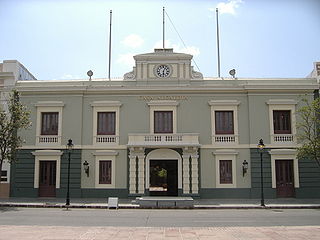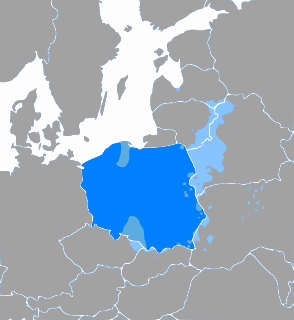
A municipality is usually a single administrative division having corporate status and powers of self-government or jurisdiction as granted by national and regional laws to which it is subordinate. It is to be distinguished (usually) from the county, which may encompass rural territory or numerous small communities such as towns, villages and hamlets.

A trust is a three-party fiduciary relationship in which the first party, the trustor or settlor, transfers ("settles") a property upon the second party for the benefit of the third party, the beneficiary.
A nonprofit organization (NPO), also known as a non-business entity, not-for-profit organization, or nonprofit institution, is dedicated to furthering a particular social cause or advocating for a shared point of view. In economic terms, it is an organization that uses its surplus of the revenues to further achieve its ultimate objective, rather than distributing its income to the organization's shareholders, leaders, or members. Nonprofits are tax-exempt or charitable, meaning they do not pay income tax on the money that they receive for their organization. They can operate in religious, scientific, research, or educational settings.

A charitable trust is an irrevocable trust established for charitable purposes and, in some jurisdictions, a more specific term than "charitable organization". A charitable trust enjoys a varying degree of tax benefits in most countries. It also generates good will. Some important terminology in charitable trusts is the term ‘corpus’ which refers to the assets with which the trust is funded and the term ‘donor’ which is the person donating assets to a charity.
A private bill is a proposal for a law that would apply to a particular individual or group of individuals, or corporate entity. This is unlike public bills which apply to everyone within their jurisdiction. Private law can afford relief from another law, grant a unique benefit or powers not available under the general law, or relieve someone from legal responsibility for some allegedly wrongful act. There are many examples of such private law in democratic countries, although its use has changed over time. A private bill is not to be confused with a private member's bill, which is a bill introduced by a "private member" of the legislature rather than by the ministry.
A criminal code is a document which compiles all, or a significant amount of, a particular jurisdiction's criminal law. Typically a criminal code will contain offences which are recognised in the jurisdiction, penalties which might be imposed for these offences and some general provisions.
A foundation is a category of nonprofit organization or charitable trust that will typically provide funding and support for other charitable organizations through grants, but may engage directly in charitable activities. Foundations include public charitable foundations, such as community foundations, and private foundations which are typically endowed by an individual or family. The term "foundation" though may be used by organizations not involved in public grant making.
Tax exemption is the monetary exemption of persons, people, property, income, or transactions from taxes that would otherwise be levied on them. Tax-exempt status can provide complete relief from taxes, reduced rates, or tax on only a portion of items. Examples include exemption of charitable organizations from property taxes and income taxes, veterans, and certain cross-border or multi-jurisdictional scenarios.
United States non-profit laws relate to taxation, the special problems of an organization which does not have profit as its primary motivation, and prevention of charitable fraud. Some non-profit organizations can broadly be described as "charities" — like the American Red Cross. Some are strictly for the private benefit of the members — like country clubs, or condominium associations. Others fall somewhere in between — like labor unions, chambers of commerce, or cooperative electric companies. Each presents unique legal issues.
A 501(c) organization is a nonprofit organization in the federal law of the United States according to Section 501(c) and is one of over 29 types of nonprofit organizations exempt from some federal income taxes. Sections 503 through 505 set out the requirements for obtaining such exemptions. Many states refer to Section 501(c) for definitions of organizations exempt from state taxation as well. 501(c) organizations can receive unlimited contributions from individuals, corporations, and unions.
A nonprofit corporation is any legal entity which has been incorporated under the law of its jurisdiction for purposes other than making profits for its owners or shareholders. Depending on the laws of the jurisdiction, a nonprofit corporation may seek official recognition as such, and may be taxed differently from for-profit corporations, and treated differently in other ways.
Public-benefit corporations are a specific type of corporation that allow for public benefit to be a charter purpose in addition to the traditional corporate goal of maximizing profit for shareholders. Depending on the country they may also be known as crown corporations, statutory corporations, or government owned corporations having monopoly over a specific service or market..
A 501(c)(3) organization is a corporation, trust, unincorporated association, or other type of organization exempt from federal income tax under section 501(c)(3) of Title 26 of the United States Code. It is one of the 29 types of 501(c) nonprofit organizations in the US.

A private foundation is a charitable organization that, while serving a good cause, might or might not qualify as a public charity by government standards. The Bill & Melinda Gates Foundation is the largest private foundation in the U.S. with over $38 billion in assets. Most private foundations are much smaller. Approximately two-thirds of the more than 84,000 foundations which file with the IRS, in 2008, have less than $1 million in assets, and 93% have less than $10 million in assets. In aggregate, private foundations in the U.S. control over $628 billion in assets and made more than $44 billion in charitable contributions in 2007.
A foundation in the United States is a type of charitable organization. However, the Internal Revenue Code distinguishes between private foundations and public charities. Private foundations have more restrictions and fewer tax benefits than public charities like community foundations.
An association of churches is primarily a term used in U.S. tax law to describe a cooperative endeavor among churches that is entitled to tax status similar or identical to the tax status of the churches themselves.
Charitable organizations in Canada are regulated under the Canadian Income Tax Act through the Charities Directorate of the Canada Revenue Agency.

Charitable trusts in English law are a form of express trust dedicated to charitable goals. There are a variety of advantages to charitable trust status, including exception from most forms of tax and freedom for the trustees not found in other types of English trust. To be a valid charitable trust, the organisation must demonstrate both a charitable purpose and a public benefit. Applicable charitable purposes are normally divided into categories for public benefit including the relief of poverty, the promotion of education, the advancement of health and saving of lives, promotion of religion and all other types of trust recognised by the law. There is also a requirement that the trust's purposes benefit the public, and not simply a group of private individuals.

In the United States, a benefit corporation is a type of for-profit corporate entity, authorized by 35 U.S. states and the District of Columbia that includes positive impact on society, workers, the community and the environment in addition to profit as its legally defined goals, in that the definition of "best interest of the corporation" is specified to include those impacts. Traditional C Corporation law does not specify the definition of "best interest of the corporation" which has led to profit motivations being used as the main driver for best interests. Benefit corporations may not differ much from traditional C corporations. A C corporation may change to a B corporation merely by stating in its approved corporate bylaws that it is a benefit corporation.












